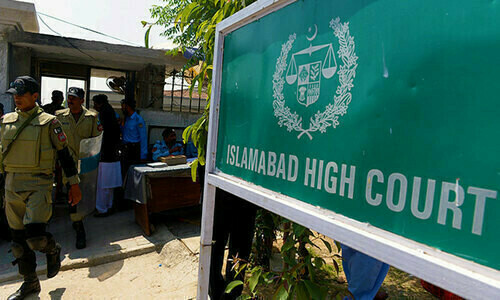ISLAMABAD, April 21: The Supreme Court announced on Thursday that a larger bench would commence from May 2 regular hearing of a presidential reference seeking its opinion on the death sentence of Zulfikar Ali Bhutto after five questions of law had been formally presented to it.
On Wednesday, a special cabinet meeting had allowed Babar Awan, the counsel of President Asif Ali Zardari, to present the questions the apex court sought to be presented.
At the last hearing, the court had suggested that the reference be sent back so that the presidency could clarify what it meant by asking the court to revisit Bhutto’s trial.
After the presentation of the questions, the bench comprising Chief Justice Iftikhar Mohammad Chaudhry, Justice Mohammad Sair Ali and Justice Ghulam Rabbani observed that the preliminary hearings had been completed and now a larger bench, the composition of which would be announced later, would take over the hearing.
But before postponing further proceedings for May 2, the court nominated ten senior jurists as amici curaie from the four provinces to assist it in view of the significance of the case. They are: Ali Ahmed Kurd, Tariq Mahmood, Abdul Hafeez Pirzada, Fakhruddin G. Ebrahim, Khalid Anwar, Makhdoom Ali Khan, S. M. Zafar, Aitzaz Ahsan, Barrister Zahoorul Haq and Abdul Latif Afridi.
Supreme Court Bar Association President Asma Jahangir, Attorney General Maulvi Anwarul Haq and advocates general of all the provinces will also assist the court.
Five questions
The five questions read out by Babar Awan before the court are:
(1) Whether the decision of the Lahore High Court as well as the Supreme Court in the murder trial against former prime minister Zulfikar Ali Bhutto meets the requirements of fundamental rights as guaranteed in the Constitution under Article 4(1) and (2a) (right of individuals to be dealt with in accordance with law), 8 (laws inconsistent with or in derogation of fundamental rights to be void), 9 (security of persons), 10A (due process), 14 (inviolability of dignity of man), 25 (equality of citizens)? If it does not, its effect and consequences?
(2) Whether the conviction leading to execution of Zulfikar Ali Bhutto could be termed as a decision of the Supreme Court binding on all other courts being based upon or enunciating the principle of law in terms of Article 189 that asks the courts to follow apex court’s judgment? If not, its effect and consequences?
(3) Whether in the peculiar circumstances of this case awarding and maintaining of the death sentence was justified or it could amount to deliberate murder keeping in view the glaring bias against Zulfikar Ali Bhutto?
(4) Whether the decision in the case of murder trial against Zulfikar Ali Bhutto fulfils the requirements of Islamic laws as codified in the Holy Quran and the Sunnah of the Holy Prophet (SAW)? If so, whether present case is covered by doctrine of repentance specifically mentioned in different Suras of Holy Quran: Sura Al-Nisa: verses 17 and 18, Sura Al-Baqara: verses 159, 160 and 222, Sura Al-Maida: verse 39, Sura Al-Aaraaf: verse 153, Sura Al-Nehal: verse 119, Sura Al-Taha: verse 82 as well as Sunan Ibn-e-Maaja, Chapter 171, Hadith No. 395. What are effects and consequences of doctrine of repentance?
And (5) Whether on the basis of conclusions arrived at and inferences drawn from the evidence/material in the case an order for conviction and sentence against Zulfikar Ali Bhutto could have been recorded?
The court, however, declined to accept a request made by Mr Awan, based on a desire of the president and the prime minister and the government, to allow at least one camera to video record the entire court proceedings in a similar fashion as was done in the O. J. Simpson murder trial held by the US superior court and the Nuremberg trials.
“We are not so advanced,” the chief justice observed but requisitioned the original record of the trial of Mr Bhutto’s case from the Lahore High Court to enable the counsel for the referring authority (Mr Awan) to obtain copies of the same, if need be, for preparation of arguments. The copies will be supplied by him to all the amici curaie.
The chief justice also stated that some of the record was also available with the Supreme Court which would also be provided to the counsel.
Later, the counsel called on the president to update him on the progress of the proceedings. The president congratulated the counsel for his efforts.












































Dear visitor, the comments section is undergoing an overhaul and will return soon.